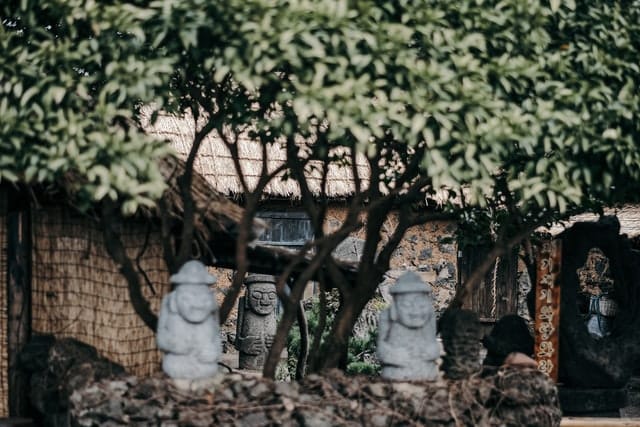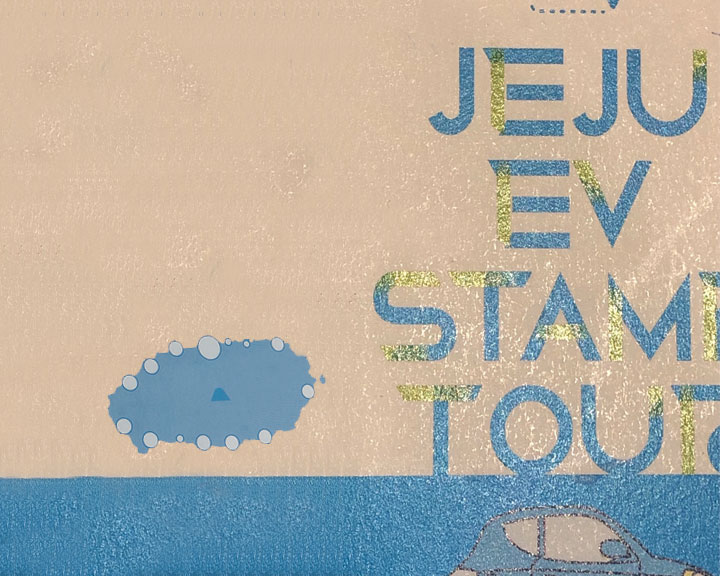Jeju Island is a wonderful island, not just because of its natural beauty and culture, but because of its leading-edge innovation towards sustainable living.
Client: Jeju EV Tours Location: Jeju, South Korea Challenge: To encourage more tourists to be eco-friendly and travel to points of interest via eBikes or EV Tours.
Getting The Gig
I lived on this beautiful island for 2 years with my South Korean fiance. Whilst most of my work came from outside South Korea at the time I came across a flyer one day whilst looking around the island and then felt compelled to volunteer to help their noble project.
Whilst there was a business element to their proposal the main aim for the client was built around social innovation, and more specifically how to ensure tourists and travellers would use EV or eBikes over petrol cars.
Following my work a couple of years earlier developing an improved petrol lane flow system I had both experience in travel innovation work, and a desire to work on the more eco side of travel.
The Background
Jeju island finds itself in an advantageous position. South Korea is now one of the leading innovative countries in the world and Jeju has often been a testing ground for this innovation. Living in Jeju and whilst it has a reputation as a holiday destination or ‘The Hawaii Of South Korea’, it’s also home to many forward-thinking innovations.
eScooters were in place there way before they found their way into the UK, for example. There are smart grids, smart farms, and smart, innovative people.
It came as no surprise then to see one of the first eco-led EV tours. The challenge wasn’t in the technology, South Korea has that down, but the challenge was to encourage local, and mainly international tourists, to forego the petrol car and consider EV instead.
Jeju is a nature island (although many amenities and facilities have been built on it for tourism), but there’s a deep care for nature amongst its locals, and you can see why. If you were to volunteer to pick up beach trash for a day you’d have a bad back by the end of it and be surprised at the amount of plastic that washes ashore. Whilst some popular tourist beaches are clean, others that fall into ‘plastic traps and current pools’ are not.

Sustainable and eco-friendly companies such as Jeju EV Tours know the importance of tourism for their business but also know that tourists bring a carbon footprint.
Therefore, their aim was to encourage tourists to be as socially and environmentally responsible as easily as possible.
Nobody on their holiday wants to constantly be consciously thinking about what footprint they might be creating, so the aim was to help them so it becomes almost unconscious choices.
Whilst EV and eBike tours are a business, the focus was really more on the social innovation elements of the business.
The Solution/s
Sustainability was key. Whilst the aim was to create an innovative solution, it was as much about the user journey and experience.
The first place any tourist comes to when arriving in Jeju is the airport. That in itself poses the potential for carbon footprint hypocrisy. The constant issue of seeking to create eco-friendly travel solutions is in how to get to the destination travelers are already adding to pollution.
Whilst we can’t fix the fuel use of planes, we could make people aware of their footprint in a non-intrusive way.
The client had already partnered up with an airline to ‘offset’ their carbon footprint, but beyond this, we realised that simply clicking on a button that said ‘yes, I will offset my footprint’ wasn’t really enough to follow through to the consciousness of actually really wanting to do something better for the environment.
Therefore, we created the ‘conscious choice’ of wanting to go further and make their whole trip eco-friendly. As part of an eco-package, when a tourist would arrive they would be shuttled to the Eco Tour premises near the airport and be given certain packages they can follow, but with the flexibility within.
We proposed a ‘stamp’ game where they would be rewarded with a discount when they filled in stamps at select parts of the island, areas they most likely would want to tour to anyway, and where there were EV charging points available.

The idea was to drive, charge, explore, drive. The client was well aware of the longer times it takes to charge EVs so the aim was to take the wait out and turn it into part of the trip, so tourists can look around places they would do anyway whilst charging.
The brand wanted to be positioned as being fun, yet environmental. We were originally going to go with the usual ‘green’ colour as people associate that with eco, but other companies (whether green or not) were positioning themselves the same way, so we wanted EVs and eBikes to stand out differently.
I remember being in Australia and seeing Wicked Campervans that stood out because of their vivid artwork but also their old campervan look. Whilst an old look wouldn’t work for EV the idea of making the cars stand out through ‘sustainable-promoting’ artwork was explored, although cultural and economic differences in South Korea meant that car paintwork had to follow a more simple format.
Therefore, we carried the ‘artwork’ idea through to the biodegradable maps that people would be given on their journey instead, especially for family packages.
The aim was to turn sustainability into a game.
When tourists would find a landmark they would also have an audio pack with them in the car that would teach them about the area, and the sustainable aim around each part of the island. When they listened to the pack they would then be presented with a digital stamp to fill in (there was also the option to do a quiz to unlock the stamp). This was all app-based.
On the eBikes, we had to be mindful about riders not being able to hear if wearing audio headsets so we encouraged walking and scenery tours in select areas once they had hit a destination. Scenery tours were about finding a picturesque setting that could be ‘stamped’ (as the stamps on the app could be filled in by a photo) and then resting their legs whilst listening to the audio about the area they had cycled to.
We created shorter stamp ‘albums’ for cyclists (the different packages you could select before your trip – a bit like how you can select different walking routes in a nature reserve), and the bike engineers worked hard on ensuring the batteries were easily chargeable in cafes along the way and not too heavy (a work in progress).
Another idea was to bring in an element of a treasure hunt, and whilst this wasn’t actually implemented in the end, it was worth mentioning. The idea was to encourage people to walk and hike further and to find ‘stamp photo points’ along the trial but they couldn’t get the council permission for this in the end.
We also reminded people of how much carbon footprint they would be saving through their trip and partnered with eco-friendly activities around the island, such as tree planting or rail bike electricity generating activities that existed in the area already. These options would be part of the packages they could select before their trip began.

The Outcome
Jeju is a wonderful island with many unique aspects to it that makes it, well, unique. From the orange trees to the natural basalt build walls, to the Oreum hills, to the ‘Dol Hareubang’ carved statues that are guardians of the island.
Part of the tour is about learning and immersing yourself around the history and culture of Jeju. As many people came to Jeju for its nature, knowing they could also contribute towards the sustained natural habitat instead of feeling guilty about traveling around it and destroying it, the EV Stamp Tour took away that guilt and turned their trip into a fun, yet productive and educational one.
A CASE STUDY FROM:


